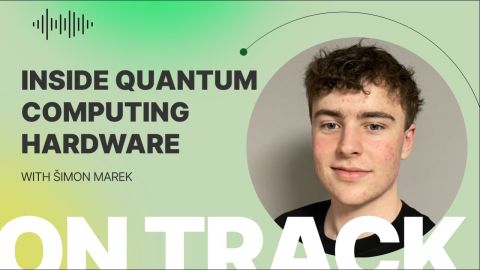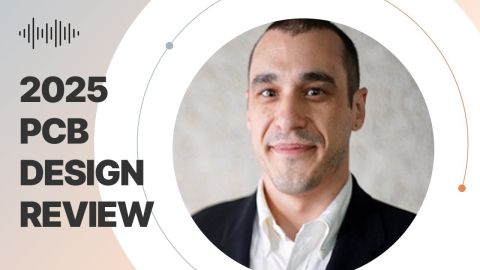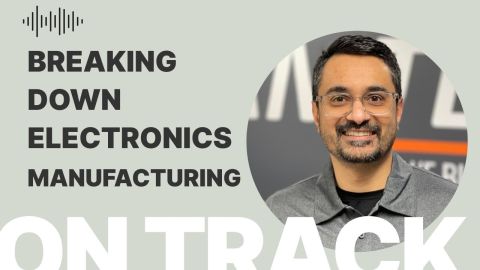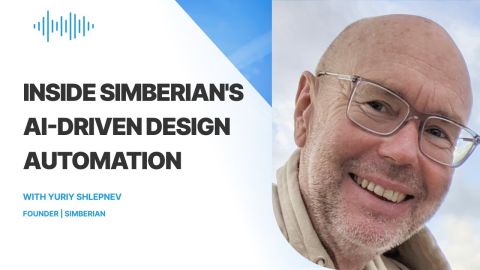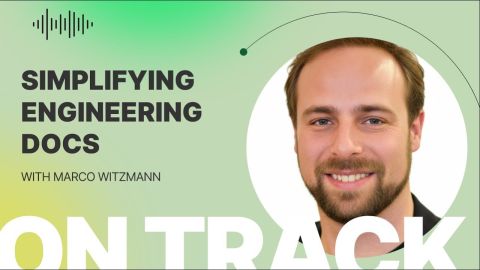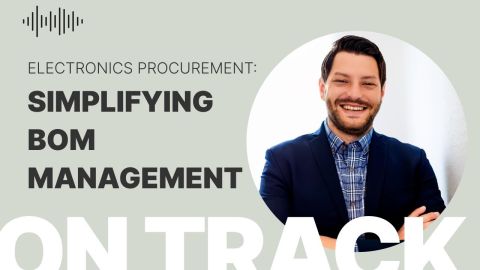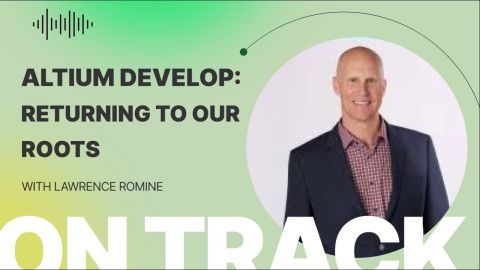Data Security, 5G and Onshore PCB Manufacturing with Dr. Rob Spalding

In this episode, we are very pleased to have Dr. Rob Spalding. He is a retired Brigade General at the US Air Force and now the CEO of SEMPRE (Secure EMP-Resistant Edge), a tech company based in Washinton DC that provides military-grade 5G and high-performance edge computing infrastructure for telecom operators, first responders, government, and enterprise customers.
Today, Rob and I will talk about all things security! Rob will tackle the importance of being proactive when it comes to protecting your data, and his advocacy to bring a better understanding of technology and innovation in Washington, DC (White House).
Listen to the Podcast:
Download this episode (right click and save)
Watch the video:
Show Highlights:
- Rob’s background and career before he became the CEO of SEMPRE
- What is SEMPRE? What are the problems it solves and the solutions it offers?
- Rob clarifies what’s written in his 5G report, which was taken out of context in 2018
- He emphasizes building enough spectrum into the network to take full advantage of the 5G technology
- Rob’s take on PCB manufacturing, and semiconductor manufacturing onshore
- Onshore manufacturing has its advantage in controlling and protecting intellectual property
- Most corporations are making decisions on the basis of, what's my margin?
- TSMC has built itself up to be the best chip company in the world because they own the manufacturing line
- Hardware-level security in base stations
- Ability to zerorize crypto–shutting infrastructure down, and shut that thing down physically destroy certain things
- SEMPRE uses FPGAs as a security advantage
- It's data that really drive value in the economy
- If we can’t protect our data, then we can't protect the integrity of who we are as individuals and who we are as a nation
- Rob demonstrates how vulnerable is the public from being spied on
- A recent survey reveals that there will be a talent shortage in the PCB design and manufacturing industry in the next 15 years
- Rob suggests allocation of budget to sponsor American kids through four-year degree programs in STEM
- During the Cold War, the US had initiated education for national security–a lot of scientists and engineers in the space race were educated through this initiative
- The advantages of bringing the manufacturing back to the US
Links and Resources:
Connect with Dr. Rob Spalding on LinkedIn
Visit SEMPRE website
Read about the shortage of talents in the PCB industry in 15 years: In an Unpredictable World, PCB DESIGN ENGINEERING Stays Steady
US Government Calls for Revitalizing American PCB Manufacturing
Connect with Zack on LinkedIn
Full OnTrack Podcast Library
Altium Website
Download your Altium Designer Free Trial
Learn More about Altium enterprise solutions
Altium 365: Where the World Designs Electronics
Claim the special offer for Podcast listeners only
Dr. Rob Spalding:
And I think if we could have a better understanding of technology in Washington, D.C. then we would rather than get the lawyers to come up with a policy that doesn't make any sense from a physics or engineering perspective, you'd get something that was better for the American people.
Zach Peterson:
Yeah. You have said that if you're going to make policy around the laws of physics, that it should be based on the laws of physics.
Dr. Rob Spalding:
Right.
Zach Peterson:
I thought that was a great way to describe it.
Dr. Rob Spalding:
If you're going to mandate that the sun revolves around the earth, it's going to be problematic in terms of navigation and other things that you're trying to understand.
Zach Peterson:
Hello everyone, and welcome to the Altium OnTrack podcast. My name is Zach Peterson. I am your host. And today I am speaking with retired brigadier General Robert Spalding, US air force. He had a very long and distinguished career in the air force before starting SEMPRE.ai. He is the CEO of SEMPRE.ai. We're going to be talking all things, cybersecurity and supply chain and a little bit of current events. General Spalding, thank you so much for joining us today.
Dr. Rob Spalding:
Thank you. Great to be here.
Zach Peterson:
Thank you. From looking at your LinkedIn profile, I wasn't sure if I should be calling you General Spalding or Doctor Spalding.
Dr. Rob Spalding:
Well, people call me Rob, General Spalding Rob, or whatever is fine.
Zach Peterson:
Of course. Of course. Well, people mess up my name sometimes as well, but Zach is fine. And you got your doctorate in economics and mathematics at University of Missouri, as I understand.
Dr. Rob Spalding:
Yeah, my undergrad and I have a master's degree was mostly in microeconomics. And so, I continued along that vein with a PhD in economics and focused on mathematics, which was really tied to filtering equations, which are used often in options pricing. But interestingly enough, it's also used in the navigation solution of the B-2, the airplane I flew, so little unknown tidbit there.
Zach Peterson:
It's funny how that works. I've published quite a few papers myself, but not to brag or anything. But there's an interesting overlap between the portfolio management and portfolio modeling and stochastics, which then also appears in engineering in some places. So I understand exactly what you're saying with that overlap. Maybe to get started, you could give us a little bit of your background, how you got into the armed services and where your career progressed, because you've had a long illustrious career in the air force and then public service, and then eventually going into the private sector.
Dr. Rob Spalding:
Yeah, well, like I said, I was in microeconomics, really. It was agricultural business. But agricultural business is really microeconomics designed for the farm and that's because my family farms. So we grew cotton and tomatoes out in California and I thought, okay, I'm going back to be a farmer. And then all of a sudden, Tom Cruise comes out with this movie Top Gun and I'm like, wow, that's exciting. So I tried to get in the Navy, and Navy didn't want me. Of course, they were downsizing.
Dr. Rob Spalding:
So tried to get in the air force. They didn't want me. And so I had to go back through college for my second degree. I ended up getting a master's in Ag business and three semesters shy, have a mechanical engineering degree, later I was commissioned in the air force and so that's why I went into the military. I didn't want to stay, because I don't like following rules, but ended up having this opportunity to go to China. And that's really what made it a career for me.
Zach Peterson:
Yeah. And I actually watched a forum club talk you gave, I believe in 2020, where you talked about that. You said it was actually a very positive experience living in China for some time.
Dr. Rob Spalding:
Yeah. And so the program's called the Olmsted Scholar Program and they give you a stipend, the service, because it comes from all the services, air force, army, marines, and Navy. Cuts you loose. You're almost like on a sabbatical. They send you to language school. I went to DLI in at Monterey to learn Chinese and then for a year, and then you're cut loose for two years to go live in the country and they give you money to travel. You study at university in the target language. And so yeah, I went to China when they had just entered the WTO. It was growing like gangbusters and brought my family with me. My kids went to a local school there and it was just a phenomenal experience. So it's two years, from 2002 to 2004.
Zach Peterson:
Okay. And I know that you, like I said, you've had a long career in the air force and I believe you were then later lead China strategist for the Joint Chief.
Dr. Rob Spalding:
Yes, after I left my career flying B-2s as a vice commander out at Whiteman, I got selected to be a senior military fellow at the Council on Foreign Relations. That was a year in New York city. And then I went from there to work for the chairman of the Joint Chief. First, it was chairman Dempsey, Martin Dempsey, and then General Dunford was, I spent a year under each. Basically, our job was to do mine and my teams, was to formulate the opinion, the chairman's opinion on a policy position with regard to China. And so things that we were working on their included things like, what are we going to do about the islands in the South China Sea?
Zach Peterson:
Yeah. I'm sure it can get a bit controversial in that position.
Dr. Rob Spalding:
Well, I mean, the cool thing about it is you get to work with your office of secretary defense counterparts. Other interagency counterparts at the National Security Council basically formulating the policy that ends up being the official national policy of the United States. So it's a really educational and great opportunity to understand how that policy making process works and in particular to provide a great service to the nation because you're enlisting the advice of experts and you're formulating your own ideas about what to include in conjunction with the chairman, what we should be doing at least from the military perspective in that case.
Zach Peterson:
Sure. Sure. I'd like to switch gears just a little bit and maybe talk about your shift into the private sector and how you got focused in electronics, because you run a company called SEMPRE AI working on 5G base station equipment. And I believe you specifically describe it as hardened 5G based station equipment. Could you maybe tell us about your problem statement and what your products are aiming to solve?
Dr. Rob Spalding:
Right. So during my time working for the chairman, that's when we started really looking deep at the industrial base. That's when I began to become aware of how little industrial base we had left, what that challenge created for the United States. So there was a period of three years there that I was working on those efforts. And then that led to my being asked to come to the White House, become the senior director for strategy, where I worked in the National Security Strategy. And part of the National Security Strategy was to say, "Hey, we need to ensure that we protect innovation technology in the United States to ensure that we can remain competitive".
Dr. Rob Spalding:
As a part of that process, I undertook a study of 5G. What is it? What does it mean for the United States? What are the opportunities and challenges? And I wrote a report. That report really got me to understand what 5G was. And in particular, I understood that not only was technology and 5G important in terms of innovation for things like autonomy and artificial intelligence, but the way that Silicon Valley had enabled the use of data, individual data for influence was also a problem. So data security, and then having the most technologically advanced 5G, which is both a wireless communication and edge compute really was kind of the essence of that paper.
Dr. Rob Spalding:
Well, as is DC, that paper was leaked by somebody in government on behalf of the telecom industry to ensure that we stopped talking about 5G as a challenge. Certainly, it's an opportunity and that's all the hype that's been attached to, but nobody wanted to know what the challenges were because in terms of industry, they were worried about regulation or legislation that would cause us to have to protect that. Well, at the same time I began to work in the Pentagon on, how do we take this technology and use it and leverage it for what the Pentagon needs? The biggest problem anybody will tell you and this is highlighted in Christian Brose's book called The Kill Chain. Anybody will tell you the biggest problem that the DOD has is interoperability.
Dr. Rob Spalding:
We have system upon system that only operates with itself and doesn't talk to each other. And so the frustration from almost 30 years in the military is, I want interoperability. Well, 5G is actually a set of standards that enable global interoperability, but it's not secure and it's not harden. And so, I started working on a project within the department of defense, but realized in the DOD that's not a good place to develop technology. It's a good place to maybe incentivize the development of technology. But if you want to develop something totally new, you don't do it in a big bureaucracy. You go out and you do it in the private sector. And so, SEMPRE was born around the idea that we needed to harden our infrastructure and protect data. And so that's how I got started, I wasn't a calm person in the military. I was a war fighter. But I was a war fighter that was frustrated by the technology that we had and wanted something better.
Zach Peterson:
Sure. Sure. I understand. And you proposed a national 5G network. It seems like this idea of keeping these technologies at home, whether it's here in the US, or whether it's another government doing it in their own backyard. It seems to fit with that idea of data security and strengthening your own economy, but also ensuring you have a sustainable electronics manufacturing base. All of it, I think, rolls together. I mean, would you agree with that?
Dr. Rob Spalding:
Well, so first of all, I did not. That was the talking point that came out of the leak of the paper that I proposed in National Network. So I did not, I never promoted that. What I did say is that technology requires that you build enough spectrum into your network that you can take full advantage of the technology of 5G. And the way that we were building networks, where AT&T took a little bit of spectrum, built a network. Verizon did, and T-Mobile did. And back then Sprint did. That meant that you could not take full advantage. In other words, you would be paying four times for your 5G and get one fourth the capacity, because each of these had a little bit of spectrum.
Dr. Rob Spalding:
And so much like we've used towers, so all, not all, but most of the carriers today put their radios on somebody else's tower. They lease space on the tower. So in that case, the carriers are sharing infrastructure. What the paper said is, we needed to share infrastructure in order to build this network with a lot of spectrum involved that would label high bandwidth, high capacity at low cost. And that got translated into, I think the government should nationalize the network. Never what I said. And some countries do this. Singapore has a single network that three carriers share, and most of Asia and Europe have lower costs for cellular and higher capacity and throughput, because they understand from a technology perspective, you have to share infrastructure in order to get the best benefits to the consumer.
Zach Peterson:
Okay, I understand. And it's what you described as the game of telephone to generate that talking point is exactly what I had read in some criticism of you. Was that you had proposed that. So thank you very much for clearing that up, because apparently I was mistaken.
Dr. Rob Spalding:
Well, I mean, that's D.C., right? You create the talking point that fits the narrative that gets the outcome that you want. You know, I think for me in terms of policy, at least I didn't talk to anybody in the telecom industry that was on the policy side. I didn't talk to lawyers. I talked to engineers and I said, "If you're going to build something, how would you build it?" And so the report was really just giving, it was supposed to meant, it was meant for, and it was being brief to the principles in government. So basically, the cabinet secretaries, I was telling them, this is what the engineers tell me 5G is.
Dr. Rob Spalding:
And this is how you take the most advantage of it from a national perspective. And I think, the problem in our country today is that in particular, and I think it's in a lot of different ways, DC delegates or designates how we're going to do something. And a lot of times it's mostly either around helping incentivizes the incumbent or otherwise providing some kind of political spin into how something should be deployed. But when you talk to the engineers, they say, "Well, this is going to be horribly inefficient because this is not how the network was designed to be in order to get the maximum benefit".
Dr. Rob Spalding:
And so I think, and you see this in the tech industry all the time. Silicon Valley says, "DC doesn't understand what we're doing." And DC says, "We don't understand what Silicon Valley is doing." And they don't understand what we're trying to get". And I think if we could have a better understanding of technology in Washington, D.C, then we would rather than get the lawyers to come up with a policy that doesn't make any sense from a physics or engineering perspective, you'd get something that was better for the American people.
Zach Peterson:
Yeah. You have said that if you're going to make policy around the laws of physics, that it should be based on the laws of physics.
Dr. Rob Spalding:
Right.
Zach Peterson:
I thought that was a great way to-
Dr. Rob Spalding:
Exactly.
Zach Peterson:
-describe it.
Dr. Rob Spalding:
If you're going to mandate that the sun revolves around the earth, it's going to be problematic in terms of navigation and other things that you're trying to understand.
Zach Peterson:
So in terms of driving something like greater onshoring of PCB manufacturing capacity or semiconductor manufacturing capacity or any other component, frankly, that goes into an electronic assembly. Is this really just a big capital allocation problem? I mean, I know that capital flows to where it's going to be most efficient and return the largest ROI. So looking at it from the surface and I've never worked at a manufacturing facility or for a manufacturer, but it seems to me that everyone is just chasing lowest cost and-
Dr. Rob Spalding:
Well, it is. But it also gives you control over your intellectual property. Again, I had a YouTube program where I interviewed a manufacturer who was manufacturing their own PCBs. They said, "We can do this at a competitive price, the same that we can get it from China. And, oh, by the way, I can control any loss of intellectual property. I designed it, I build it, I keep that technology". But the problem they were having because of the tariffs were some of these sub-components that I was bringing in were tariffed but then the final product was not.
Dr. Rob Spalding:
And so it was hurting their business, but the bottom line was you can manufacture competitively today through automation PCBs, and the big problem are sub-components and tariffs. And understanding that I think is a real eye eyeopener for people. Now, you said, "Capital allocation". Why was this individual allocating capital? Well, because they were a small business. They wanted to manufacture their own components. They were really willing to take a lower margin in order to see that they had built their own manufacturing capability. Now they made that decision, but most corporations are making decisions on the basis of, what's my margin?
Dr. Rob Spalding:
Not, do I want to have this for a strategic reason? Do I want to have this as a competitive advantage for my company in terms of being able to protect my intellectual property from competitors? The problem with the United States is a large corporation tends to think in terms of quarterly earnings reports. And when you think that way, you don't do the strategic investment to see that over time if you protect your intellectual property, if you own your supply chain, if you own your manufacturing, not only will you not subject to disruptions, like we've seen with regard to coronavirus, but it makes it far harder for any competitor to compete with you.
Dr. Rob Spalding:
Because built into the manufacturing process is 75% of the path of innovation. You have both in terms of improving the process with regard to manufacturing, but also proving your product. You know, the reason TSMC is the best chip company in the world is not just because of the way it designs chips. It manufactures a lot of chips for companies like Qualcomm, for example. It comes through the manufacturing process where they actually understand the fallacies and flaws that come through design, and then they work to improve those things.
Dr. Rob Spalding:
So over time, TSMC has built themselves up to be the best chip company in the world because they own the manufacturing line. And I think it was coming from China and the supply chain is broken. So one of the things that we're proud of at SEMPRE is that we build it entirely out of the US and allied countries, so we have not been impacted by the supply chain. And we, we're not subject to disruption. And over time, we seek to get hundred percent of what we're building, if not from United States at least from North America, because it really reduces the risk that you have as a company to serve your customers.
Zach Peterson:
Sure. Sure. I think I'd like to switch gears one last time and get a little more into hardware level security, which is something that I definitely think does not get enough attention. We had recently talked with someone named Joe Grand on the podcast, stylizes himself as a hardware hacker, which I guess is a good moniker or a good designation for him, because he had a lot of insight into how you could essentially break into a piece of hardware. And I guess thinking like a hacker is the way he puts it is the best way to enforce security.
Zach Peterson:
Do you see the proliferation of 5G and essentially the larger number of base stations in many base stations that you would need for operating in the higher gigahertz ranges to be a security issue potentially? And I mean, is SEMPRE in a position to try and address that or is anybody in a position to try and address that? Because obviously, you add in more infrastructure. You add in more points of broadcast and receive. You have a greater attack surface and then there is that potential for hardware level security issues somewhere down the line.
Dr. Rob Spalding:
Right. Well, there's recently a good article talking about the computerization of 5G. And one of the topics they brought up in there is something called DU pooling. So, O-RAN, open RAN is really about breaking up these components that were typically hardware and make them run in software, but then they don't run in the same locations. You'll have the radio at the tower and maybe you'll have the DUs at the base of the tower. And then you have the CUs at the back with the core. The problem is as you have all of this infrastructures spread out, people have access to it. Like at the base of a tower, there's usually a room where if you have the four digit code, you can walk into the room and guess what?
Dr. Rob Spalding:
Now you can touch all of the equipment that's there. And so, you may have three carriers operating there. If one of those carriers happens to have Huawei equipment involved, guess what? You've got a Huawei technician that has access to all of that equipment. And so hardware security really there's a couple of components to it. One is just the overall, the supply chain of that hardware. The other is, who has physical access to your hardware? This is pretty secure. The iPhone's pretty secure. It's encrypted. But guess what? If I hand that iPhone to you and you have physical access over it, you can get into it. You can crack into it. And so having physical control over your infrastructure is very important.
Dr. Rob Spalding:
But as I said, as you go from the core all the way down to the antenna, there's all of these different pieces of infrastructure that somebody can go and put their hands on. And therefore, you don't have physical security over the infrastructure. And so if you don't have that, then you don't actually have security because somebody can go in and plug a USB drive, or they can stick something in between that. And so what we did, we took the approach of, from the core to the antenna, we're going to seal that up and we're going to make sure that nobody can touch it. And if somebody does get into our infrastructure, we're going to know it, and we're going to be able to zerorize crypto.
Dr. Rob Spalding:
We're going to be able to shut that thing down. We're even going to be able to physically destroy certain things that we don't want them to see. And so having that physical security over your infrastructure is only part of the process. Other things that I brought from my days flying a nuclear arm bomber is two person control. You got to have two people anytime you do any kind of critical where you're touching either the software or hardware on your network. You got to vet those people. Who are they? So ultimately, it's a people. It's a material, the supply chain, and it's a procedures by which you operate your infrastructure that ensures that everything's secure.
Dr. Rob Spalding:
And if you have a breakdown in any one of those, then you have vulnerabilities that seep in. And so I absolutely agree with hardware security. The other thing that we do is we have FPGAs that are a part of our architecture. And with FPGAs, you can be very deterministic with regard to how you look at things and how you do things. And so it's a lot harder to hack hardware based processing than it is where most of your processing is done in software. So in many ways we use FPGAs as a security advantage. There's a hardware. In other words, a hardware layer to our security when you're talking about not just the physical security, but also the architecture of how we develop the SEMPRE node.
Zach Peterson:
I see what you're getting at. Yeah, by instantiating it inside of an FPGA, you essentially eliminate the type of exposure that you might have when you're, let's say throwing data back and forth between, I don't know, an MCU and a bunch of peripherals, and it's all just built into shape.
Dr. Rob Spalding:
Right. And there's things that you can do between FPGAs that are, you have two disconnected nodes and you're basically using hardware techniques there to add another layer of security. You know, all of that doesn't matter if you don't encrypt your data. So encryption, and not just at the network layer. If you encrypted the data layer, now you've got an added level of capability where... So it's really the entire thing from end to end, how you think of data. Is it a valuable resource that you want to ensure that the owner data is the only one that can dictate who, what, where can use it, or is it just something where I know I could be hacked, so I'm just going to wrap some security around it?
Dr. Rob Spalding:
Ultimately, I just want to have the fastest network, or I want to have the most collaboration maybe. But if you're not focused on the value of data and that's really, to me, going forward, it's not oil, it's data that really it drives value in your economy. And it's not just in the economy, it's a company level and at the individual level, because it basically defines who you are.
Dr. Rob Spalding:
The things that you do is your data and your data, just giving that up or exposing on an unsecure system means that everything that you are as an individual is open for basically being unexploited, sometimes to your ill intent, not to your benefit, but not only that, but not to the nation's benefit. And I think that's the real thing that I saw at the White House, is if we needed to... If we were going to protect our democracy going forward, it wasn't just our supply chain. It was our data. If we didn't protect our data, then we can't protect the integrity of who we are as individuals and who we are as a nation.
Zach Peterson:
Sure. Sure. I totally agree with you. In terms of these issues of like physical layer security, data security, how are maybe other countries in Europe faring? You brought Singapore earlier with their national network that is shared by three carriers. How is their strategy comparing to what you've just outlined?
Dr. Rob Spalding:
Well, I think the easiest one to look at is Europe. They came up with GDPR and everybody says, okay, GDPR data, that's the way to go. Well, the fact it remains that I can take GDPR data from software development kit data that's coming for the software development kits for devices that you can freely purchase today. I can take that data, even if it's "GDPR" and I can spend a couple hours watching those devices and I can begin to determine who is connected to that device. And once I connect a identity to a device, now the world's my oyster, and I can know everything about you.
Dr. Rob Spalding:
And I'll just give you an example. You know you can draw a circle around the Pentagon right now, and through SDK data, you can see what's going on, what are the devices that are around the Pentagon? And then you can take a step back and say, let me watch this device. Let me see where that person goes. And on the basis of their throughout the day where they go, back home or wherever, you begin to say, okay, they keep going back to this address in Alexandria. I wonder who lives at that address. So it's very easy, very quick to basically identify anybody in the United States who has a smartphone and then begin to watch.
Dr. Rob Spalding:
Okay, now I know that's their device. Where do they go every single day? What's that metadata that's being collected about that device? And this is the thing that I think both from a national security perspective, our leaders don't really understand. But also from an individual perspective, we don't understand that, oh my gosh, how vulnerable am I to being singled out and spied on? And then for what purpose is that information used? Is it used against me or is it used against my employer? Is it used against the nation? These are all things that we have to be concerned about.
Zach Peterson:
I think people who experience that experience the most benign form of it, which is just targeted advertising, which at minimum is annoying. And I think it's driven, I know it's driven me off of social networks except for LinkedIn. But you know, you've brought up a bit of an area of security that I think most folks don't think about. And so, what I'm hearing with the security thread is that, you have to draw the... Oh, not the parallel, but you have to see the connection between what happens at the IP level, when you're going to manufacture, what happens at the hardware level, where you actually build the device so it's not accessible, or if it is accessible, it is hardened in some way to where you can't really get the data. And then what happens at the application level or the software level in order to protect that data and also to protect the IP itself.
Dr. Rob Spalding:
Yeah. And so you bring up the ad data. That's a great example. You can hack that, right? Because you can say in this area, in this geographic area, I'm going to bid five cents for ads. And when you do that, you win. So we're talking about, you can target an ad to you as an individual, and that ad could be for a purpose. It could be to sell you something, or it could be to get you to click on something so that you download malware, so that now I'm into your device. So, I mean, this is a brilliant way to social engineer people, it's completely available. You don't have to be a nation state actor to do this. You can sit in your basement at home and figure it out.
Zach Peterson:
Yeah. Yeah. And I was going to say, I know that we've mentioned nation state actors both on this podcast, but in previous podcast, but you brought up like criminal organizations getting ahold of this data, or possibly even just getting ahold of a device so they can figure out how to hack it.
Dr. Rob Spalding:
Absolutely, and it's all open now. And I think, one of the things that when you're thinking about national security throughout the 20th century, we thought about territory. How do we control territory? In a lot of ways it had to do with resources. Well, today it's not about territory so much because we're interconnected. It's about data. And so if you don't have control over your data, it's the same thing as if you have no borders of your country and that anybody... So say like if we had open borders and some farmer from Canada could come over and just take 40 acres for himself in America. Well, we have all kinds of ways that we could prevent that, but that's literally what's going on today in the data sphere.
Dr. Rob Spalding:
I mean, your data has no borders. It has no protection. Another example is when one oil tycoon drills under your property to suck out the oil that's under your... That's a similar thing that's going on today. And unfortunately, when you look at it as a legal problem and you don't look at it as a systemic problem, like it's a problem for the nation writ large. It's not a problem because this bad person does this thing. It's like how we organize our society. And in this case, how do we organize and instantiate it in our technology so that the world we live in is actually the rules that we want to live by are instantiated in that technology. That's what we're talking about, because if you don't do that, then you have no way of owning the things that in today's digital world make you you.
Zach Peterson:
Sure. Yeah. And I think there's a number of ways to confront or to devise some solutions to that problem. I mean, I'm hearing policy being one important aspect, and we brought up the IPC press release that indicates that I think government is starting to take some of these issues of diversification and onshoring seriously. But one thing that we've been talking about quite a bit at Altium and on this podcast has been education and educating the next generation of designers and engineers. And there's already going to be a talent shortage that is projected over the next 15 years.
Zach Peterson:
There's a recent survey in that will actually link to the survey in the show notes. But there's a recent survey that projected 78% retirement rate over the next 15 years, or by the end of the next 15 years. And so there's a real talent shortage coming up to actually implement some of these solutions and devise some of these solutions. What can the electronics industry do to try and encourage maybe changing some of these problems, encourage taking account of these risks, encourage security at whether it's a hardware level, software level, whatever level it is to hopefully create a more sustainable supply chain.
Dr. Rob Spalding:
Yeah. So before I address education, I will just say in regards to policy, we need a standard. We need standards that are actually for security and privacy. And if we do that, if we take something like an industry body like 3GPP, and we say, okay, that's great for interoperability, but guess what? We're going to add another layer on top of that, which is going to say, Hey, we're going to focus on data security, data sovereignty, and privacy. Then you have the interoperability, and then you say, Hey, if you're going to operate in the United States, then your technology has to be according to these standards.
Dr. Rob Spalding:
In terms of education, it's a really good example of how we misallocated resources over the last 30 years. One of the things I did when I was at the White House, one of the people in my office, I asked her, what could we do with the money that we're spending each year in Afghanistan? And so what we found was every year that we were in Afghanistan, we could put 200,000 American kids through four year degree programs on STEM. So 200,000 new scientists and engineers educated every single year we're in Afghanistan. So if you're there for 20 years, that's 5 million new people that could be part of the workforce over those 20 years.
Dr. Rob Spalding:
And so we have the resources in this country. We just don't allocate them correctly. And it doesn't mean that we have to not bring in people from the outside. But I would say that one of the things we did do in during the Cold War, we had something called education for national security. A lot of our scientists and engineers that were like in the space race, that's where they got educated. The federal government said, "I need engineers and scientists. I'm going to pay for American kids". And guess what? There's a lot of kids out there that don't have the financial means to get a degree, or when they get a degree today, they're saddled with enormous debt. That's how we could better spend the resources of the federal government to ensure that the industry has the talent they need to be innovative and competitive.
Zach Peterson:
Yeah. Yeah. And I think that's going to go a long way towards encouraging onshoring because one of the challenges that's highlighted in onshoring is lack of manufacturing knowledge, and talent, and enough people to just come in and fill those jobs. I mean, you can build all of the Intel factories you want in Ohio, but what if you started building $20 billion PCB factories. Are you going to have enough people to actually staff it to be able to actually run the thing? And I've recently contemplated whether or not that has contributed to the lack of diversification in the electronics manufacturing supply chain.
Dr. Rob Spalding:
I guess, having looked at this, it's really kind of a crutch because if you're talking about a PCB manufacturing line, the number of people that are on that line are very, very small. And so I don't think people will understand that, a lot of the stuff is automated. Now, when you're doing component assembly, where you're manufacturing a full blown device. Yeah, you're going to need some hands on work there. But that's not necessarily always a highly educated workforce. And so it's a combination of things and so not only do we need new scientists and engineers, but we also need trade schools where people that actually get the skills that can work on those manufacturing lines.
Dr. Rob Spalding:
There's this, I think wrongheaded belief in America that people don't want to work in manufacturing. There's a lot of people that want to work in manufacturing. And, oh, by the way, in a lot of ways, that is how we used to get a lot of immigrants coming into the country. They wanted to make a better life for themselves. And they were coming in to basically do those jobs. And so it also becomes a way to bring in new people that are fleeing, maybe oppressive areas where they appreciate the freedoms that they can and the opportunities that come from being an American citizen.
Dr. Rob Spalding:
So we've tended to want to bring on only engineers and scientists for H-1Bs. But I think we also need to remember that we need to have jobs for blue collar people to come into too, because they end up being the families that produce a white collar people that end up taking on those higher end jobs later on in their generation. So this is a great thing about America. It has this ability because of the allure of our system to bring in new people that refresh what it means to be an American and how important this system is.
Zach Peterson:
Yeah. Yeah, absolutely. And I totally agree with what you said about trade school and the fact that PCBs actually started as kind of a trade school level thing. I guess, as the technology has become more advanced, so has the level of knowledge and skill required to be able to build them to function properly. But that doesn't mean you don't need folks to actually just get on the line and run stuff.
Dr. Rob Spalding:
No, I was just going to say absolutely. And there's people that really want to do that. That's the life they choose and not everybody's going to be a software developer because they don't want to. And we should honor that and we should have opportunity for those people, not just say, Hey, we're going to send that somewhere else. And you're just not going to have a place in this society. To me, I think that's one of the big mistakes that we did when we off-shored so much of our manufacturing capability.
Zach Peterson:
Would you say that because of the industrial policy in like Germany, Japan, that they have this, a similar type of talent crunch going on, or is this just in US?
Dr. Rob Spalding:
Well, I think what they do is a lot of those people now are flowing to those countries. So Europe has incredible diversity in terms of who's coming into work in Germany. It's not just Germans anymore. And so I think that's a lesson learned. China's got an endless supply of people just because they're China, but there's also people that want to come in and we need that. We need that as a nation. We need that new infusion of appreciation for the principles of our constitution, which really make us a unique society.
Zach Peterson:
Well, it's great to hear that people at least are open to this kind of inclusive narrative and bringing new talents in to try and bolster an industry that has just gone overseas and I think there's been a lot of consternation or worry that it's never going to come back. In fact, when I was just recently at PCB West, I talked to so many people and it seems like every conversation eventually devolved into, there used to be so many manufacturers. They've all closed down. Or who knows if it's ever going to come back and remarks like that.
Dr. Rob Spalding:
We built the first nuclear weapon. That was a huge industrial project that was done mostly in secret. It was the biggest industrial program in the history of the world. If we want to bring manufacturing back, and I think we need to. It's not that we can't do it. It's just, we have to summon the will to do it. It is not a, can you? It is, will you?
Zach Peterson:
Understood. Understood. I think I'm going to leave it at that because I think that's a very inspiring message. So thank you very much General Spalding for joining us. This has been a really insightful talk and we hope that all of the listeners will check out the show notes. We'll go learn about SEMPRE.ai. You can connect with General Spalding on LinkedIn. Also read some of the other resources that we'll post in the show notes. General Spalding, thank you again so much for joining us.
Dr. Rob Spalding:
Thank you. It's been a pleasure.
Zach Peterson:
Thank you. And to all the viewers and listeners out there, don't stop learning, stay on track, and we will see you next time.

